War Horse Symposium Sheds Light on Vital Role of Military Journalism for Democracy, National Security
In an interview last week at The War Horse Symposium, comedian Jon Stewart asked Deputy Defense Secretary Kathleen Hicks about a broad range of topics ranging from toxic exposure to veteran unemployment to declining national service. But the most attention by far has focused on an exchange about the Pentagon’s ballooning budget.
“If I give you a billion dollars, and you can’t tell me what happened to it, that, to me, is wasteful,” Stewart said. “It’s a tough argument to pay an $850 billion budget to an organization that can’t pass an audit and tell you where that money went.”
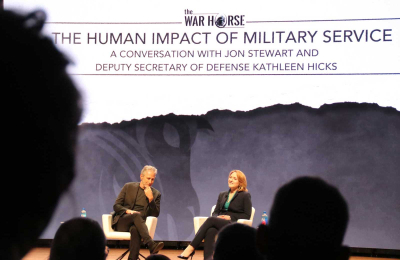
Talk show host Jon Stewart and Deputy Secretary of Defense Kathleen Hicks engage in a conversation that covers everything from the needs of military families to benefits, and from the relationship between journalists and the Defense Department to how the military tracks its money. Photo by Babee Garcia, The War Horse.
Last year, the Pentagon failed its fifth consecutive audit. The Department of Defense’s budget is the largest in the U.S. government, and it is the only U.S. government agency that has never successfully passed an audit. This year, the military’s budget request is $842 billion.
Hicks, the second-highest official in the Defense Department, pushed back, arguing that some of the funding priorities Stewart named—notably, veterans’ benefits—were outside the purview of the Department of Defense. Still, she said the Pentagon is working toward better accounting for its budget.
“It’s absolutely the case that the United States military should be able to pass an audit,” Hicks said.
The interview marked the headline event at The War Horse’s first annual symposium, which also featured remarks and commentary from VA Secretary Denis McDonough, Sen. Tammy Duckworth, legendary journalist Bob Woodward, and Medal of Honor recipient Flo Groberg, among others. A white paper that examined how declining media coverage of the military threatens national security and widens the military-civilian divide, written by the University of Chicago’s Harris School of Public Policy and based on data from The War Horse, inspired the event.
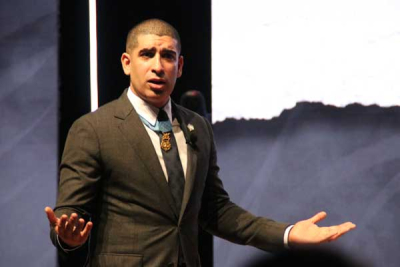
Medal of Honor recipient Florent Groberg talks about how he struggled after the actions that earned him the Medal of Honor, but also about how he tries not to look back and to instead use his experiences to move forward. Photo by Babee Garcia, The War Horse.
“The War Horse Symposium underscored the critical role that military reporting has on our national security and the health of our democracy by bringing together senior leaders from the DOD and VA alongside such influential journalists,” said Thomas Brennan, executive director of The War Horse. “Their involvement helped to shed light on how issues that may seem limited to veterans and military families in truth have major implications for all Americans.”
‘The Failure to Shine a Light Has Incredible Costs’
The day-long symposium, hosted at the University of Chicago, kicked off with remarks from Bob Woodward, who spoke about the importance of refusing to become numb to war and its consequences, as well as the role that good journalism plays in preventing that from happening. His own service in the Navy during the Vietnam War prepared him for his career as an investigative reporter—including first bringing him into contact with the man who would later become an indispensable source in his coverage of the Watergate scandal, he said.
Woodward recalled delivering papers from a Navy admiral to the White House as a young lieutenant. “I sat waiting outside the Situation Room,” he said. “There was a man with gray hair and a white shirt, very distinguished looking, and we were like two people waiting, sitting next to each other on a transatlantic flight. His name was Mark Felt.”
Award-Winning Journalism in Your Inbox
Following Woodward, panelists like Michèle Flournoy, the former undersecretary of defense and a War Horse board member; Sam Kille of Report for America; and Rajiv Chandrasekaran, formerly of The Washington Post, underscored the critical role that robust local and national military reporting play in shoring up national security and highlighted the importance of an informed citizenry in a democratic system.
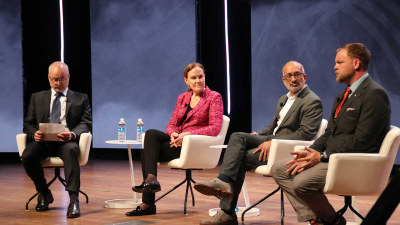
Ethan Bueno de Mesquita, interim dean of the Harris School of Public Policy; Michèle Flournoy, former undersecretary of defense and War Horse board member; Rajiv Chandrasekaran, head of policy and strategy at the emes project and former senior correspondent and associate editor of The Washington Post; and Thomas Brennan, founder of The War Horse, talk about the importance of journalism as a national security issue. Photo by Babee Garcia, The War Horse.
“I see the cost as being much more than just one being borne by our veterans and military family community,” said Chandrasekaran, a former senior correspondent and associate editor at The Washington Post, of declining military reporting. “The failure to more thoroughly shine a light on the current military experience, what our military is doing today, and those who are part of it, and importantly, our veterans—what they’ve done, their lives today, and the associated issues there—I think has incredible costs for our democracy.”
The event also highlighted what dogged military reporting can accomplish, in a conversation between The War Horse Managing Editor Kelly Kennedy and VA Secretary Denis McDonough.
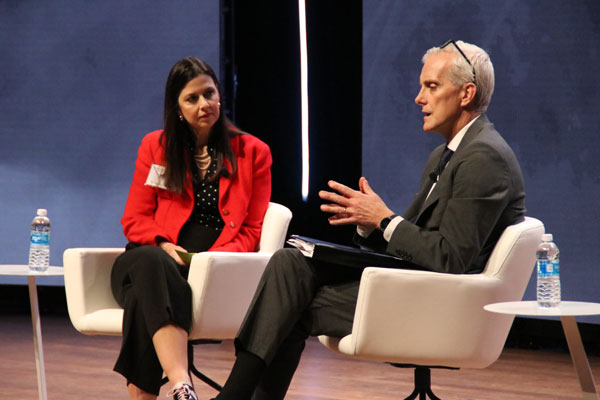
War Horse Managing Editor Kelly Kennedy interviews Veterans Affairs Secretary Denis McDonough about the PACT Act at The War Horse Symposium in Chicago. Kennedy was the first to report, in 2008, the health problems related to the burn pits. Photo by Babee Garcia, The War Horse.
Kennedy was the first journalist to report on the toxic effects of burn pits—massive open-air trenches where the military burned hazardous waste next to troops’ living quarters on bases in Afghanistan and Iraq—as a reporter at Military Times. The two spoke about veteran health care and the PACT Act, a bill that expands benefits for millions of veterans exposed to various toxins during their military service, which Congress passed last year—14 years after Kennedy’s initial reporting. In his remarks, McDonough emphasized VA’s efforts to reach veterans who are owed benefits.
“That’s why I’m really excited about the PACT Act,” McDonough said. “It should be the start of a conversation, the renewal of a conversation, maybe, with veterans who feel that they’ve had a bad experience with the VA in the past.”
Part of starting that conversation, he said, is engaging with the media.
“We start from a position that says there are veterans who could be enrolled with us who are not, so we want to reach them,” McDonough said. “The reason to be transparent with [the press] is to make sure that we can reach those vets.”
‘We Have to Connect the Military Better to Society’
Stewart’s interview with Hicks topped the evening, which Hicks began by emphasizing the Department of Defense’s commitment to transparency and freedom of the press.
“The United States military is about defending the Constitution, and the free press is part of the Constitution,” she said. “Any major institution hears hard truths, and the press helps bring that.”

Randee Howard, operations associate at The War Horse, talks about her experiences dealing with harassment in the Navy, as well as what it felt like to graduate from Columbia University. Photo by Babee Garcia, The War Horse.
But Stewart disagreed with her characterization of press transparency within the Pentagon.
“I understand the official position of the Pentagon is, ‘We welcome good journalism, and we try,’” he said. “But I know for a fact there are layers of people there that stand between journalists and information, and they do so purposefully.”
Like any large organization, Hicks responded, the military has layers of people who may act differently, but insisted that leadership within the Pentagon was committed to transparency as a tool to help service members.
“Everywhere you look, there’s disconnectedness, and that’s very, very challenging,” Hicks said. “I think for the country overall, we have a major civics problem. And we in the Defense Department feel that in the recruiting challenges that we have. We have to connect [the military] better to society. People need to understand the service. The more people are focused on service in general, the more military service has resonance, they understand it better.”
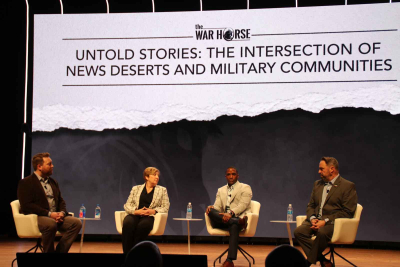
War Horse director of writing seminars David Chrisinger, War Horse Fellow and military spouse Valerie Sutton, Ohio National Guard Capt. Derek Moore, and Report for America interim Vice President of Communications Sam Kille talk about the importance of getting military and veteran news out to areas where there may be no local news—or no local military reporter. Photo by Babee Garcia, The War Horse.
Hicks and Stewart sparred over a number of other issues as well, most notably the Pentagon’s budget priorities, with Stewart coming back again and again to the resources the military puts toward developing weapons and the money that goes to defense contractors, compared with the resources it devotes to caring for troops.
“I’m a human being who lives on the Earth and can’t figure out how $850 billion to a department means that the rank and file still have to be on food stamps,” Stewart said.
Hicks pointed toward recent pay raises for military members—including a requested 5.2% raise in next year’s budget—as well as the department’s efforts to combat food insecurity among service members. In 2020, Defense Department research found that nearly a quarter of all military families struggled with food insecurity.
The evening ended on a point of agreement.
“This is the kind of dialogue we have to have,” Hicks said. “We have to be able to talk about the challenges we face as a society and certainly as a military. And we have to be getting better. I think we’re getting better. But we need Americans to come along.”
Our Journalism Depends on Your Support
“That’s why I think an organization like The War Horse is so crucial,” Stewart said. “It’s independent. It’s outside of the status quo. It’s outside of the system. It can have these tough conversations, but it is not owned by it.”
This War Horse feature was reported by Sonner Kehrt, edited by Kristin Davis, fact-checked by Jess Rohan, and copy-edited by Mitchell Hansen-Dewar. Headlines are by Abbie Bennett.





Comments are closed.